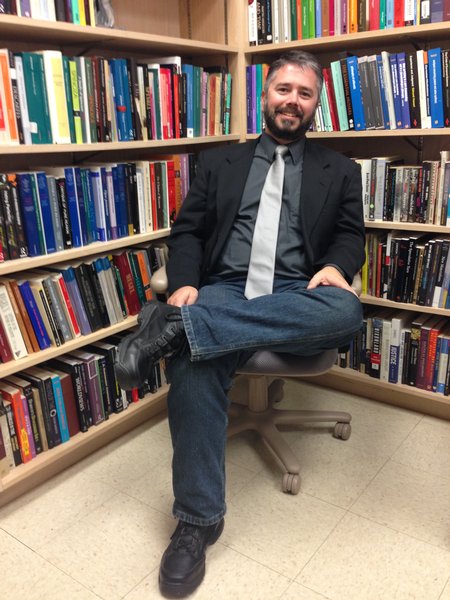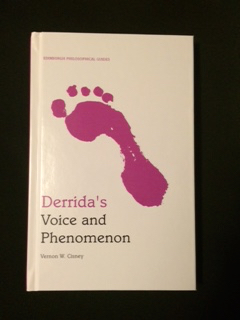Prof. Vernon Cisney - Voice and Phenomenon

How did you decide to write this book?
From the moment I first read Jacques Derrida, I was drawn to his being a thinker that doesn't shy away from complexity. I wrote my doctoral dissertation on Derrida and another French thinker named Gilles Deleuze, and Voice and Phenomenon was an important book for me. There were no resources available dealing with the arguments, focus, and structure of the book and I thought there should be a guide.
The other reason I wanted to write this was “teach-ability.” Major philosophers tend to have one book that serves as an introduction to their thinking, for example Plato’s got the Republic. For Derrida, the go-to book up until now has always been Of Grammatology, another 1967 text. It always struck me as an odd go-to teaching tool. It is sprawling and you cannot understand the book if you do not know all the many figures he is discussing. The nice thing about Voice and Phenomenon is that it is short and focused. He is working on one figure, Edmund Husserl, and on three or four particular arguments, which are small, digestible bits. One can easily introduce Husserl, founder of the school of thought known as phenomenology, and move to Derrida’s work.
It is also in Voice and Phenomenon that Derrida discovers concepts that later become his philosophy, which are: différance, the trace, and the logic of the supplement.
How would you summarize Derrida’s philosophy?
Derrida’s thinking is almost completely parasitic. He thinks by working his way into texts. It is parasitic in that he gets inside these argument structures and tries to reveal something fundamental about them. In order to do this, he works closely through the logic or the language of another philosopher. He is trying to expose a differential play of force at work in the constitutions of the various binary oppositions that govern Western thought.
 The first is that he reads through a text, exploring the surface argument that the author wants to push, which is called “authorial intent.” Derrida provides pretty conservative readings in this first step. The first reading exposes the privileging of the primary term, for example soul over body, or soul/body.
The first is that he reads through a text, exploring the surface argument that the author wants to push, which is called “authorial intent.” Derrida provides pretty conservative readings in this first step. The first reading exposes the privileging of the primary term, for example soul over body, or soul/body.
This brings us to the second phase – the phase of inversion. He will push that logic of that term up to its absolute limit to the point where that primary term gives way to the secondary term. He tries to show how it bleeds into that secondary term. If that supplementary term is required in order to think about the primary term, that can only be because the primary term was never fully able to do what it needed to do in the first place. There is an essential lack in the primary term to being with. It cannot stand on its own. It suffers from an essential deficiency. The primary term is not, after all, primary. This shows, in some cases, the privileging of the secondary term. Derrida is providing a reading that subverts the first reading.
In the third phase, he wants to mark the differential structure that makes both terms possible. So, if the opposition is invertible, and if each term to ultimately give way to its other, then what is being isolated is the “/” in the binary. The terms are always subject to the passage to the other. By demonstrating that differential structure, which he calls différance, he hoped to be able to release alternative ways of thinking and living, alternative ethical practice and so forth.
What do you think Derrida would be most curious about today?
He would be very interested in ISIS. Derrida died in 2004, after September 11, 2001, and he foreshadowed calamities to come. In later works, he writes almost exclusively about real-world problems and also the topic of apocalypse, the sense of annihilation for the sake of annihilation. I think he would have a tremendous amount to say about how the forces of globalization have helped foment the forces of ISIS.
The other thing I think he would be very interested in is the Syrian refugee crisis. In many of his later essays, Derrida focused on the concept of “hospitality.” I think he would be interested in looking at the contrast between the professed values of many Western nation-states and the ways in which they are dealing with the Syrian refugee crisis.